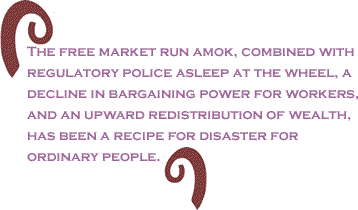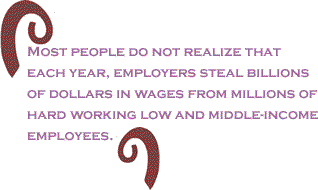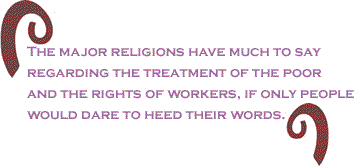
|
|||||||||||||||||||||||

|
|

Custom Search
|
|
 |
|
In this winter of economic discontent in America, many people feel as if they have been robbed, and in fact they have. Unscrupulous Wall Street investment managers run off with billions of dollars of hard-earned money. Retirement savings and 401k’s vanish without a trace and seemingly without a remedy. Unregulated markets allow banks to prey on the public with mortgages containing unconscionable hidden terms and penalties. Meanwhile, corporate beneficiaries of the taxpayer-financed bailout extravaganza plot with conservative activists to kill the Employee Free Choice Act - which will facilitate the formation of unions - in order to “save” American capitalism and prevent the U.S. from turning into France. The free market run amok, combined with regulatory police asleep at the wheel, a decline in bargaining power for workers, and an upward redistribution of wealth, has been a recipe for disaster for ordinary people. Meanwhile, most people do not realize that each year, employers steal billions of dollars in wages from millions of hard working low and middle-income employees. Someone could face a year or two in jail for stealing $1000, yet a crime of this grand scale goes unpunished. On this second anniversary edition of the Color of
Law column, it is fitting that I review the book, Wage
Theft in America: Why Millions of Working Americans Are Not Getting
Paid - And What We Can Do About It Car washers, wait staff, drivers, hotel workers, stock brokers, farm workers, department store employees, poultry workers, the list goes on and on. These are the victims of wage theft. The crime takes many forms. Some employees are paid below the minimum wage, which is against the law. Others have their tips stolen from them, or are forced to work off the clock, without the overtime pay they deserve. Many are denied workers’ compensation and other benefits to which they are entitled, or denied rest and lunch breaks, or made to pay a fee in order to work on the job. Some are denied their first or last week of pay. Many of the victims are immigrants, particularly undocumented, but the typical victim is native-born and White or Black.
Although the full extent of the damage in absolute dollars is unknown, even a pro-business source, the Economic Policy Foundation, estimates that companies steal $19 billion in unpaid overtime each year. And over the past few years, companies have paid over $1 billion annually to settle unpaid overtime claims. For example, in 2005 Allstate paid a $120 million settlement to 3,000 insurance adjusters in California. In 2006, Citigroup paid $98 million to 20,000 brokers who were shortchanged. UPS had to pay $87 million in 2007 for 20,000 drivers who were not paid overtime. That same year, Walmart settled with 86,680 workers for $33 million. There are numerous factors which explain why wage theft is committed on such a large scale in the United States. Of course, there is racism and sexism, and the dehumanization of immigrant groups. Sometimes, the labor laws are so confusing that employers do not realize they are breaking the law. In addition, there are the global conditions which encourage wage theft. For example, globalization has created a downward shift in wages across the world. Some companies may not explicitly engage in wage theft as official policy, but may promote and fire managers based on how low they can keep costs. In a competitive environment where all companies are stealing from their workers, the company which does what is right, ethical, and legal is penalized. Meanwhile, many workers, unorganized and afraid to stand up for their rights, face retaliation and termination for demanding what is due to them. Bobo provides a number of solutions to the problem, including stronger unions, providing incentives to businesses to do the right thing, substantial financial penalties for lawbreakers, and beefing up the Department of Labor with more enforcement staff. In the book, the author takes a look back at the heyday of the department, when Frances Perkins was secretary of labor under President Franklin D. Roosevelt. The first woman cabinet member under any president, Perkins played a major role in creating Social Security, the National Labor Relations Act, the Fair Labor Standards Act, the Civilian Conservation Corps, and many other programs. This proud legacy stands in marked contrast to recent years at the Department of Labor, where former DOL secretary under Bush, Elaine Chao, used every speaking opportunity to pat herself on the back and praise the state of the economy under that administration. Not once during her tenure did Chao, who lacked labor experience, advocate for higher pay, better benefits or reduced injuries for workers.
Bobo believes that community groups and religious groups have a role to play in fighting wage theft as well. The book decries the recent trend towards prosperity gospel among some churches, and acknowledges the important role that progressive religious organizations have played in the labor movement. After all, the major religions have much to say regarding the treatment of the poor and the rights of workers, if only people would dare to heed their words. Moreover, social justice-oriented scriptures from Islam, Judaism and Christianity that are quoted by Bobo are a welcome part of this book. The author notes that Moses, who led a workers strike in Egypt against Pharaoh, was one of the world’s first labor organizers. As the product of a union household, whose father is a retired printing pressman, and whose mother is a municipal employee in New York, I appreciate and applaud Bobo for writing Wage Theft In America. At a time when the possibilities for a resurrected labor movement are stronger than in any time in decades, I trust that the ideas articulated in this book will find their way to the Obama administration. BlackCommentator.com Editorial Board member David A. Love, JD is a lawyer and journalist based in Philadelphia, and a contributor to the Progressive Media Project, McClatchy-Tribune News Service, In These Times and Philadelphia Independent Media Center. He contributed to the book, States of Confinement: Policing, Detention, and Prisons (St. Martin's Press, 2000). Love is a former Amnesty International UK spokesperson, organized the first national police brutality conference as a staff member with the Center for Constitutional Rights, and served as a law clerk to two Black federal judges. His blog is davidalove.com. Click here to contact Mr. Love. |
|
Any BlackCommentator.com article may be re-printed so long as it is re-printed in its entirety and full credit given to the author and www.BlackCommentator.com. If the re-print is on the Internet we additionally request a link back to the original piece on our Website. Your comments are always welcome. eMail re-print notice
If you send us an eMail message we may publish all or part of it, unless you tell us it is not for publication. You may also request that we withhold your name. Thank you very much for your readership. |
|
| |
|
| February 5, 2009 Issue 310 |
|
| Executive Editor: Bill Fletcher, Jr. |
| Managing Editor: Nancy Littlefield |
| Publisher: Peter Gamble |
| Est. April 5, 2002 |
Printer Friendly Version
in resizeable plain
text format or pdf
format. |
| Frequently Asked Questions |
 |

|
 |
 |
 |
| |
| |






































